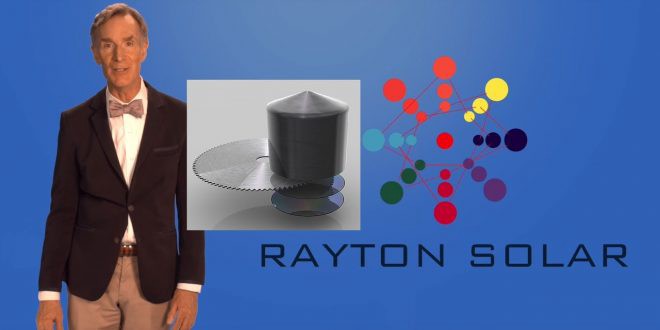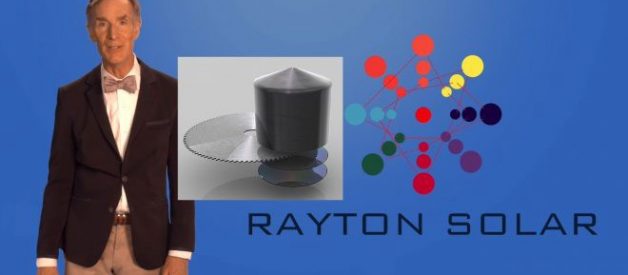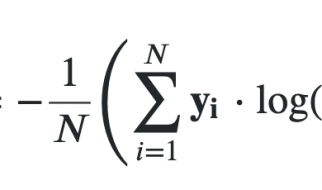 Bill Nye Pitching Rayton Solar
Bill Nye Pitching Rayton Solar
Rayton Solar, a company endorsed by Bill Nye the Science Guy raised a financing round by asking regular Americans to invest. Rayton ads painted a picture of an easy opportunity but there are details hidden in the investment documents that every investor should be aware of.
The crowdfunding round has now closed, but this offer is still worth a close look as an example of abuses in equity crowdfunding. We reviewed the investment with two questions in mind:
- Is this a fair investment?
- Will Rayton make an impact on renewable energy?
So first, is this a fair investment?
Our Answer: No ? definitely not.
Investors and clean energy enthusiasts on Facebook and Instagram are being asked by Rayton and Bill Nye to make an investment on terms that almost no experienced investor would make in ANY company. We think the terms are unfair and unethical. Rayton has purposely offered these ?unfriendly terms? to investors in order to make it likely that the CEO and Directors would profit even when the company fails and investors lose all their money.
If you have already invested on StartEngine, we recommend withdrawing your investment now. StartEngine should not allow Rayton?s terms at all.
What?s the problem? The strange investment terms Rayton chose to offer allow the founders to take money from investors and spend it on themselves rather than invest it in Rayton. This is a big red flag. All money raised should go to build technology required to make Rayton a valuable company. It?s hard to overstate how offensive this is as an investor. In basic terms, this means the owners could take some of the money from you, the potential investor reading this, and buy a bunch of beach houses in Florida or more than 30 Teslas while Rayton fails and you lose everything.
The founders allow themselves to do this in their official investment filing:
?After each closing, funds tendered by investors will be available to the company and, after the company has sold $7,000,000 worth of Common Stock, selling securityholders will be permitted to sell up to $3,000,000 worth of Common Stock.?
If Rayton sells $10 Million worth of shares, $3 Million of that investor money can go straight into the pockets of the owners such the CEO, and UCLA professors, Dan Rosenzweig and Mark Goorsky. Not good. All investment should be spent building technology so Rayton can repay investors. Stated another way, with these bad investment terms, Rayton?s failure could cause investors to lose everything while the CEO and two ?related party? owned holding companies walk away with $3 Million in cash. Experienced investors never allow that.
While founders are sometimes allowed to sell equity in late investment rounds, it?s basically unheard of to do that at Rayton?s stage. It?s a clue that Andrew Yakub, Dan Rosenzweig, and Mark Goorsky aren?t confident in Rayton?s technology, and are looking to make quick money by taking it directly from small scale investors.
Worse, it appears that Rayton is using investor money to buy more Facebook ads, to raise more money from investors, some of which it?s using to buy more ads. That would be similar to a ponzi scheme with money from early investors being spent to get money from new investors rather than on building Rayton technology.
There is a Second Major Red Flag. The price of each share Rayton is higher than almost any other startup ever so it?s a bad deal for investors.
A typical company at this stage with similar technology might be worth $2.5-$10 Million at an early ?Series A? stage. If expert investors thought the technology was very promising they might value it at around $25 Million.
Rayton is selling shares at a value ?post money? between $60 Million and $267 Million (see page 14 of their investment circular). That means they claim that right now it could be worth over $200 Million.
Almost all companies at this early stage are worth less than $30 Million. How could Rayton ask crowdfunders to invest at a valuation 6 times worse? (Click here to see a graph of other companies at the same series ?A? stage). The graph doesn?t even go past $100 Million. Put another way, Rayton investors could pay 4 times as much as the early investors in Uber paid.
Finally, a bit of irony in from the Rayton site: ?The CEO is a two time clean technology entrepreneur with his previous solar startup currently valued at $15 million.? Taking the $15M valuation for his previous startup (started in 2009) and the implication the quote makes that Rayton might achieve similar results (a $15 Million valuation in 8 years), it suggests investors would lose at least 75%.
An editorial aside: This post only implies that THIS clean energy investment is a bad one. Our country and planet urgently need more clean energy investment, incentives and subsidies. The best social and environmental science shows the impact of climate change will be devastating. A fast transition to clean energy drives huge benefits.
For people considering a Rayton investment, the motivation is a good one. For better results, consider investing in a publicly traded clean energy index fund like these. For those not requiring return of capital, consider a donation to a nonprofit working on climate change like the Natural Resources Defense Council, or support for political candidates that support clean energy.
This post recieved a lot of attention from climate deniers and libertarians who apparently don?t like Bill Nye because he communicates the scientific consensus on climate change. That is an absurd reason not to like Bill Nye, but his silence while Americans are misled for their money is a great reason.
2. Will this help the solar industry? Our Answer: Almost certainly not.
The Rayton video misleadingly implies that using less silicon will change the solar industry. There are two problems. First, there is the capital cost of machines, higher operating costs, and the fact that thinner silicon wafers could require expensive changes elsewhere in the process of making a solar panel. It?s not clear that Rayton panels will be cheaper. Second, and more importantly, using less silicon wouldn?t solve the key cost issues of solar. Solar panels are less than half the cost of most solar systems and silicon, which Rayton says it saves, is only a small part of solar panel cost.
In addition, other technologies that require less silicon are more advanced than Rayton?s and will likely beat it to market with lower costs (if a large market even exists for more silicon efficient cells, which is not clear).
More damning still is the fact that the challenges to wide scale solar adoption are no longer around panel cost. The challenges now are increasingly around tax policy, grid infrastructure, capital cost, land, and the above mentioned cost of everything from labor to power inverters (?balance of system? in industry jargon). Silicon cost is simply not the major issue.
As this review has become more widely read, people with more background have weighed in with better analyses of technical issues. We believe this post on the Y combinator discussion board by Matt Channon is informative. Also be aware that no reputable solar investors are listed as supporting Rayton.
Unethical Enough to Act:
Researching Rayton unveiled the extent to which investors are being deliberately misled while Rayton raises millions of dollars from casual investors. Many of these investors are likely not wealthy and are less able to absorb the losses associated with being misled by a company like Rayton. This is unethical enough that action needs to be taken to stop it.
- Bill Nye should speak up publicly so more well meaning people who want to support solar do not lose money. It?s possible and even likely that he wasn?t aware of the investment terms and was simply paid to read a script. He clearly failed to do some basic diligence, but the fact that his brand is being tarnished for what can?t have been a lot of money makes it likely he didn?t have ill intent. Regardless, Bill Nye needs to fix this.
- Other professionals who are involved in Rayton have an opportunity to raise awareness. According to Rayton?s public website, world reknowned UCLA professor Dan Rosenzweig and solar expert Mark Goorsky, another highly regarded scholar, are board members who may be in a position to help.
- StartEngine bears ethical responsibility for allowing investor unfriendly terms to be sold. The JOBS act made equity crowdfunding legal. It?s poorly implemented if Rayton?s unethical terms are legal. Startengine should prohibit ?cash-out? offerings and add onerous langauge around early stage exec pay to make schemes like Rayton?s more difficult to pull off. WeFunder, CrowdFunder, IndieGoGo, etc. should do the same to preserve collective reputations. Startengine must end Rayton?s campaign.
*More editorial: The JOBS act was probably a good thing and was addressed in a really interesting episode of the Startup Podcast.


